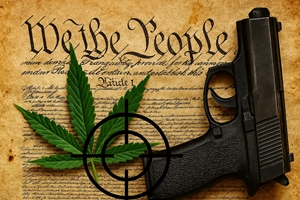It’s no secret that Donald Trump rarely acts without a hidden agenda. His latest move, asking the Supreme Court to uphold a federal law banning gun ownership by illegal drug users, including those who regularly use marijuana, raises a deeply suspicious question: Is this about public safety, or political control?
On its face, the case seems like a contradiction. Trump has long positioned himself as a champion of the Second Amendment, rallying his base with promises to protect gun rights. Yet now, his administration is pushing to restrict those rights for millions of Americans. Not because they’ve committed violent crimes, but because they use a substance that’s legal in their state.
And here’s the kicker: 75% of the states that have legalized recreational marijuana are governed by Democrats. These “blue” states represent the heart of Trump’s political opposition: urban, progressive, and increasingly vocal. If the Supreme Court sides with Trump, it could set a precedent that allows the federal government to disarm peaceful citizens based on lifestyle choices sanctioned by their own state laws.
That’s not public safety. That’s political warfare.
The Slippery Slope of Selective Enforcement
Trump has already shown a willingness to invoke national security to justify sweeping executive actions, from immigration bans to surveillance expansions. What’s to stop him from applying that same logic to weed users?
Imagine a scenario where federal agencies demand access to dispensary records, citing “terrorism risk” or “national security threats.” Suddenly, millions of Americans, disproportionately in blue states, are flagged as “unlawful drug users” and stripped of their gun rights. No trial. No violence. Just a quiet erosion of liberty.
This isn’t paranoia. It’s pattern recognition.
| Constitutional Crossfire – Guns, Weed, and Federal Overreach |
|---|
| Second Amendment vs. Federal Drug Law ➡️The Second Amendment guarantees the right to bear arms. ➡️Federal law (18 U.S.C. § 922(g)(3)) prohibits gun ownership by “unlawful users” of controlled substances, including marijuana, even in states where it’s legal. ➡️This creates a legal paradox: citizens obeying state law are punished under federal law. Tenth Amendment: States’ Rights ➡️The Tenth Amendment reserves powers not delegated to the federal government to the states. ➡️States have legalized marijuana through democratic processes, yet federal enforcement undermines those choices. ➡️If the federal government can override state law to restrict constitutional rights, what powers do states really have? Fourth Amendment: Privacy and Surveillance ➡️Enforcing a marijuana-based gun ban could require access to dispensary records, medical registries, or purchase histories. ➡️Without probable cause, this raises serious Fourth Amendment concerns about unreasonable searches and surveillance. Equal Protection and Selective Enforcement ➡️If enforcement disproportionately targets residents of blue states, or specific demographics, it could violate Equal Protection under the Fourteenth Amendment. ➡️The Constitution doesn’t allow rights to be applied unevenly based on geography or lifestyle. The Stakes This about whether the federal government can use one law to erase another right and whether citizens in certain states are less protected by the Constitution than others. |
The Authoritarian Playbook
History offers chilling parallels. In Nazi Germany, Jews were banned from owning firearms. In Venezuela, Hugo Chávez disarmed civilians before the country collapsed into chaos. In China and North Korea, gun ownership is virtually nonexistent, a cornerstone of totalitarian control.
The logic is always the same: disarm the opposition before they can resist.
Trump may not be building gulags, but he’s testing the boundaries of federal power. And if cannabis use becomes a reason for constitutional disqualification, what’s next? Political affiliation? Social media posts? Attendance at protests?
A Call to Defend Liberty – Not Just Guns
This isn’t just about marijuana. It’s about whether the federal government can weaponize law to punish dissent. It’s about whether your rights depend on your ZIP code, your governor, or your personal habits.
If we allow this precedent to stand, we risk creating a two-tiered America; one where red-state gun owners are patriots, and blue-state gun owners are criminals.
That’s tyranny.
